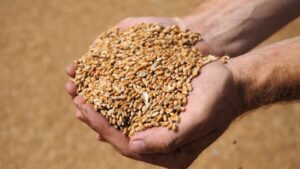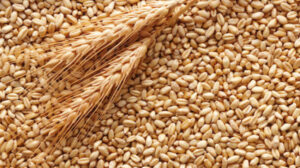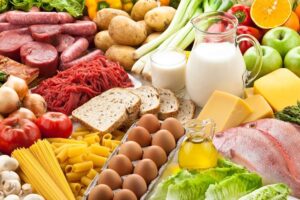
The Slovak government has decided to extend the ban on imports of wheat, corn, rapeseed and sunflower seeds from Ukraine until the end of the year, Prime Minister Ludovit Odor said.
“The European Commission did not extend the ban on imports of four commodities from Ukraine, including wheat, after September 15, so the government decided to ban their imports at the national level. And this is until the end of the year and for the same four products, i.e. wheat, corn, rapeseed and sunflower seeds. We must prevent excessive pressure on the Slovak market to remain fair to domestic farmers,” Odor said, according to Aktuality.
According to him, this step of the government is also a reaction to a similar approach of Poland and Hungary. Odor emphasized that the Slovak government will continue to work intensively with the European Commission and EU member states to find a pan-European and systemic solution while the national ban on imports of these four products is in effect. He stated the government’s readiness to lift the ban in this case.
The Ministry of Agriculture and Rural Development of Slovakia added that this decision is related to the protection of the domestic market and is a logical response to the practice of neighboring countries that adopt unilateral import bans.
“The ban does not apply to the transportation of goods through our territory, which expresses our solidarity with Ukraine and the placement of its goods in target markets,” the ministry added.

The trade flow of agricultural products through road and railway checkpoints in Volyn increased 19 times in 2022, and the number of food products (1-24 groups of UKTZED) cleared by customs posts in the “export” mode increased 10 times, the press service of the Volyn Customs reported.
“Volyn Customs coped with a significant increase in workload due to promptly taken measures to optimize the time of customs procedures, redistribution of personnel, joint projects with border guards and the Polish side of the pilot projects of vehicle passage,” the report quotes the head of Volyn Customs Yuriy Ivaskiv as saying at a field meeting of the Verkhovna Rada Committee on Agrarian and Land Policy.
Commenting on the work of Polish veterinary services on the Ukrainian-Polish border, Ivaskiv said that the Ukrainian side had repeatedly raised this issue at international meetings. However, the Polish side has stated that it is impossible to speed up these types of state control due to contradictions with the legislation of the European Union.
“Certain types of control (in particular, veterinary control – IF-U) can only be carried out at the border,” Ivaskiv reminded.
He noted that in August of this year, on average, 625 trucks were accepted at the Dorohusk checkpoint from Yahodyn per day, of which only 43 were carrying food products. Given the fact that all grain goods, including technical grain, are sent by the customs authorities for veterinary control, and product samples are examined within 2-3 days, trucks with this category of goods are waiting to cross Yahodyn in a separate electronic queue, he explained.
Ivaskiv reminded Volyn agricultural producers of the new requirements of the Customs Code, which will come into force on November 7, 2023. He recommended that everyone should not hesitate to apply for customs simplification in the NCTS or the status of an authorized economic operator (AEO).
“This will allow agricultural businesses to export products to the European market without having to present the goods to customs,” summarized the head of the Volyn Customs.

Trade statistics in the first half of 2023 compared to the same period last year showed an increase in trade in goods between Norway and Ukraine by 26%, the Norwegian-Ukrainian Chamber of Commerce (NUCC) reported.
“An important and notable trend is the significant 31% increase in Norwegian imports from Ukraine. This increase was primarily driven by growing demand for food and agricultural products used in feed production,” the NUTP said.
According to the report, in other sectors such as manufacturing, engineering, furniture and clothing, the level of trade remained stable.
A similar revival in Norwegian-Ukrainian trade relations was seen in the supply of goods from Norway to Ukraine, which grew by 25% in the first half of the year compared to last year’s figures.
Growth in seafood trade, according to the NUTP, was “particularly impressive” – up 18% compared to previous years of cooperation. Export revenue for this product category rose by 25% in monetary terms, driven by higher prices.
In addition, Norway increased its exports of electric cars in the reporting period – more than 800 units were delivered to Ukraine in June alone. “These exports account for about one-third of all imports of electric cars to Ukraine, which made Ukraine the most important export market for used Norwegian electric cars,” NUTP summarized.

Agriculture and Rural Development Minister Robert Telusz has assured the Sejm that the ban on imports of Ukrainian grain to Poland will continue after September 15, polskieradio.pl reported.
“Prime Minister Mateusz Morawiecki and Polish Deputy Prime Minister Jaroslaw Kaczynski made it clear: Ukrainian grain will not enter Poland after September 15. We will protect Polish agriculture,” Telusz said.
In mid-September, the ban on imports of wheat, corn, sunflower seeds and rapeseed from Ukraine to Poland, Slovakia, Bulgaria, Romania and Hungary will expire.
Five of Ukraine’s neighboring countries are in favor of extending the ban at least until the end of the year.
Polish Prime Minister Mateusz Morawiecki said that Poland would maintain the existing ban even without the consent of the European Commission.
As reported, Ukrainian Prime Minister Denys Shmygal considers Poland’s intention to continue blocking the export of Ukrainian grain amid Russia’s aggression as “an unfriendly and populist step” that “will hit the world food security and Ukraine’s economy hard”. He called on the European Commission to ensure unimpeded export of Ukrainian food to the EU.
In her turn, First Deputy Prime Minister and Economics and Trade Minister Yuliya Sviridenko admitted that Ukraine might introduce mirror measures against some products from Poland.

The European Union has fully exempted imports of agricultural products from Moldova from duties and quotas, extending and expanding the current temporary preferential treatment.
“The extension and expansion of the (preferential) measures aims to further expand the existing trade flows from Moldova to the EU, and this will support the Moldovan economy,” said Hector Gomez Hernandez – Minister of Industry, Trade and Tourism of Spain, which holds the presidency of the Council of the EU until the end of the year.
He emphasized that Thursday’s EU Council decision is particularly important given the ongoing military actions in Ukraine, as well as the fact that Moldova was granted EU candidate status a year ago.
Trade between the EU and Moldova is mostly liberalized under the 2014 Association Agreement. Duties were imposed on imports of only seven products to the EU: plums, table grapes, apples, tomatoes, garlic, cherries and grape juice. Introduced a year ago and valid until July 24, the preferential regime provides duty-free quotas for these products. The current decision suspends all remaining tariff rate quotas (TRQs) for one year.
The preferential treatment of imports from Moldova of the said products will entail a loss of EU customs revenues, but it will amount to about 0.3 million euros per year, so its impact on the Union budget will be “very limited,” the press release said.
The measures are expected to help Moldova further reorient its exports to the EU. Overall, its volume is set to increase from €1.8 billion in 2021 to €2.6 billion in 2022.

Moldovan Railways has agreed to grant a discount of 27% to the existing tariffs for transit transportation of Ukrainian agricultural products through the territory of the Republic of Moldova in the direction of the ports of Reni, Giurgiulesti and Galati, the press service of the Ministry of Agrarian Policy and Food reported.
Minister of Agrarian Policy and Food of Ukraine Mykola Solskiy, Minister of Agriculture and Food Industry of the Republic of Moldova Volodymyr Bolia and the head of the Moldovan railroad agreed on the discount at an online meeting. The meeting was attended by representatives of Ukrzaliznytsia JSC.
According to the message, tariff conditions for transit cargoes will be calculated as a discount to the base tariffs if all forwarding organizations comply with transportation volumes.
For recalculation of the tariff it will be necessary to fulfill one of two conditions – to produce the established volume of cargo transportation for the month or to keep the average monthly volume of transported cargo for the last three months at a level that exceeds or corresponds to the established volume of cargo transportation for the month.
The new tariff conditions will take effect on July 15, 2023.
You can familiarize yourself with the size of the tariff coefficients here: